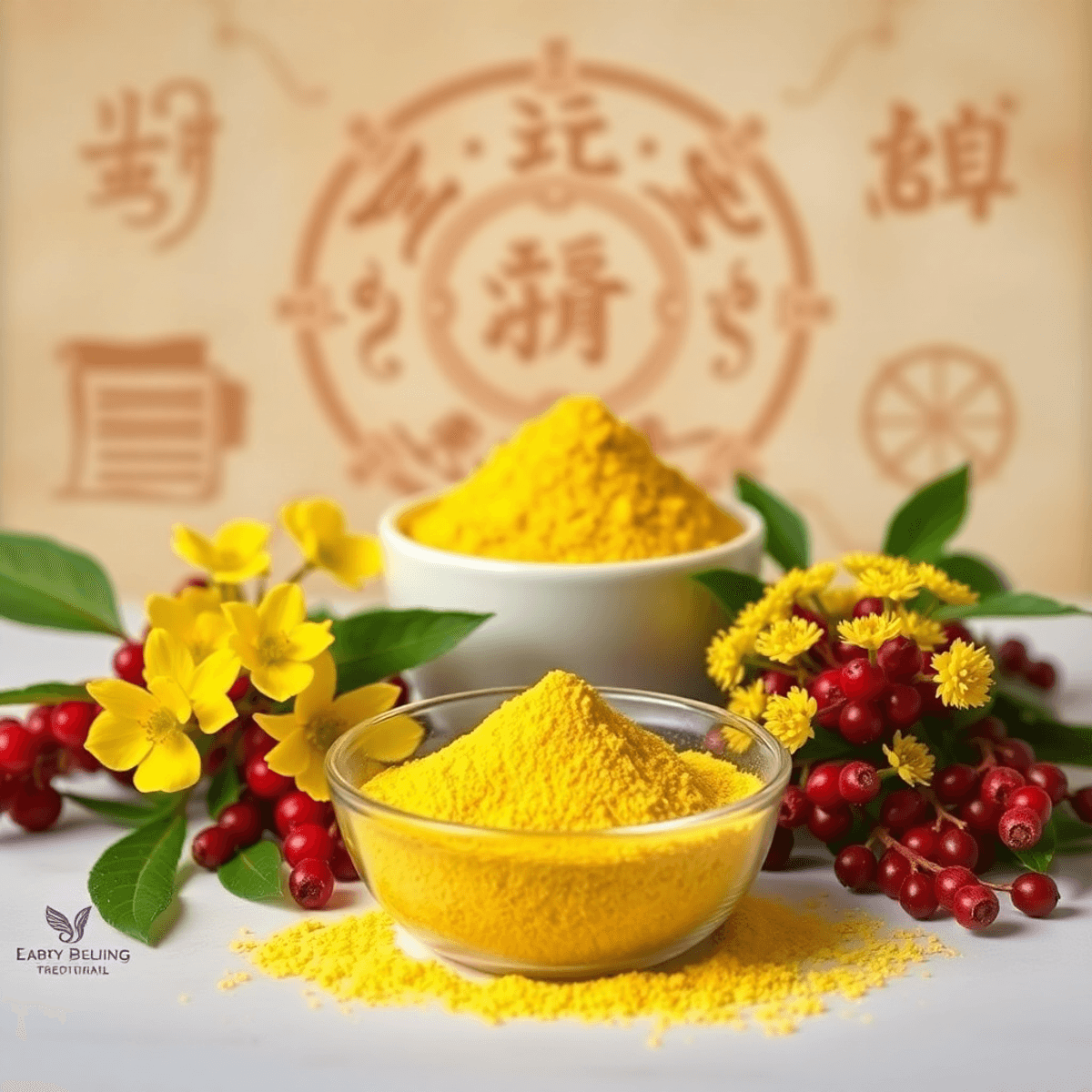Ashwagandha: A Natural Remedy for Anxiety and Stress

Introduction
Ashwagandha, a revered Ayurvedic herb, is gaining recognition as a natural remedy for anxiety and stress relief. Known scientifically as Withania somnifera, it has been traditionally used in Ayurvedic medicine to promote overall well-being and vitality. Its adaptogenic properties help the body resist physical and mental stress, making it an attractive option for those seeking holistic approaches to mental health.
In this article, you'll discover:
- The science behind ashwagandha's effectiveness in managing stress.
- Health benefits that extend beyond stress relief.
- Safe ways to incorporate ashwagandha into your daily routine.
Exploring these aspects will provide you with a comprehensive understanding of how this ancient herb can be an ally in modern wellness practices.
Understanding Ashwagandha: The Adaptogenic Herb
Ashwagandha, also known as Withania somnifera, is a highly regarded Ayurvedic herb with a rich history in traditional medicine. It comes from India and is well-known for its ability to help the body adapt to stress. This herb grows in dry areas and has been used for hundreds of years to promote balance and vitality.
What Makes Ashwagandha Effective?
The healing properties of ashwagandha come from its active ingredients:
- Alkaloids: These compounds are known to have a calming effect on the nervous system.
- Steroidal Lactones (Withanolides): Withanolides have anti-inflammatory and antioxidant effects.
- Saponins: Saponins play a role in modulating the immune system.
- Withanolides: These compounds help reduce oxidative stress and inflammation.
Traditional Uses of Ashwagandha
In Ayurvedic medicine, ashwagandha has been used for various purposes:
- Stress Management: Ashwagandha is commonly used to help manage stress and anxiety.
- Energy Boosting: It is often taken as a tonic to increase energy levels.
- Longevity Support: Ashwagandha is believed to promote longevity and overall health.
- Mental Clarity Enhancement: The roots of ashwagandha are used in formulations aimed at improving mental clarity and focus.
- Physical Endurance Improvement: Athletes sometimes use ashwagandha to enhance physical performance and endurance.
- Immune Function Support: This herb is also thought to support immune function.
Ashwagandha's wide range of benefits makes it an important part of Ayurvedic practices, offering a holistic approach to wellness that goes beyond just relieving stress.
The Science Behind Ashwagandha's Effectiveness in Managing Stress
Ashwagandha has gained attention for its ability to protect the nervous system, making it a promising candidate for supporting cognitive function and mental health. Research highlights its potential to safeguard the nervous system, which can be particularly beneficial for maintaining brain health and preventing cognitive decline.
Studies have shown that ashwagandha may play a role in managing mental health conditions such as schizophrenia. The herb's active components, including withanolides, have been found to have protective effects on brain cells. This is crucial for individuals with schizophrenia, where neurodegeneration and oxidative stress are common concerns.
In addition to its neuroprotective abilities, ashwagandha's impact on cognitive function is noteworthy. Early findings suggest improvements in memory, attention, and information processing, offering hope for those seeking natural ways to enhance cognitive performance.
In summary, ashwagandha's ability to regulate the body's response to stress also extends to protecting and improving brain health. Through these mechanisms, it emerges as a versatile herb with potential benefits for both mental well-being and cognitive resilience.
The Science Behind Ashwagandha's Efficacy in Stress Management
1. Mechanism of Action
Ashwagandha interacts with several inflammatory mediators such as cytokines and enzymes that promote inflammation. By inhibiting these mediators, it helps reduce inflammation and related symptoms.
2. Benefits for Osteoarthritis and Rheumatoid Arthritis
Osteoarthritis: This degenerative joint disease often results from wear and tear on the cartilage. Ashwagandha's chondroprotective effects help preserve cartilage integrity, potentially alleviating pain and improving joint function.
Rheumatoid Arthritis: As an autoimmune condition characterised by chronic inflammation, rheumatoid arthritis can benefit from ashwagandha's ability to modulate immune responses, thus reducing inflammation and joint damage.
Studies suggest that incorporating ashwagandha into a treatment regimen for these conditions can enhance quality of life by reducing pain and improving mobility. Its dual action of anti-inflammatory and analgesic effects makes it a valuable natural remedy for individuals seeking alternative options to conventional treatments.
The Science Behind Ashwagandha's Efficacy in Stress Management
Ashwagandha for Anxiety and Stress Reduction
Research has shown that ashwagandha can significantly reduce anxiety and stress levels. A study published in the Indian Journal of Psychological Medicine observed participants experiencing reduced anxiety symptoms after daily supplementation with ashwagandha root extract over 60 days. This adaptogenic herb appears to modulate stress by regulating cortisol, a hormone often linked to stress responses.
Comparison with Other Natural Remedies for Stress Relief
Several natural remedies are commonly recommended for stress relief, including:
- Valerian Root: Known for its sedative properties, it is often used to promote relaxation and improve sleep.
- Lavender: Frequently utilised in aromatherapy, lavender oil can help reduce mild anxiety and stress through its calming scent.
- Chamomile: Popular as a tea, chamomile is praised for its soothing effects on both mind and body.
While these remedies offer their own benefits, ashwagandha stands out due to its comprehensive action on both psychological and physiological stress pathways. It not only addresses hormone regulation but also exerts neuroprotective effects that support cognitive health, offering a holistic approach to managing stress and anxiety.
Exploring the Holistic Health Benefits of Ashwagandha Beyond Stress Relief
Ashwagandha is not only renowned for its stress-relieving properties but also plays a significant role in fatigue management. The herb works through several mechanisms to alleviate stress-induced fatigue, which is a common consequence of chronic stress and anxiety. Ashwagandha's adaptogenic nature helps balance cortisol levels, the hormone often elevated during prolonged stress, thereby restoring energy levels and reducing exhaustion.
Managing fatigue is crucial for maintaining overall well-being and vitality. Persistent fatigue can lead to diminished quality of life, impacting mental clarity, productivity, and emotional health. By incorporating natural remedies for fatigue like ashwagandha into your routine, you can enhance energy levels and support optimal functioning.
The active constituents in ashwagandha, such as withanolides, contribute significantly to its therapeutic effects. These compounds aid in improving mitochondrial function, which enhances cellular energy production—key to combating fatigue. Research indicates that regular use of ashwagandha may result in improved endurance and stamina, making it an effective natural remedy for individuals battling chronic tiredness.
By addressing both mental and physical aspects of fatigue, ashwagandha offers a holistic approach to restoring balance and promoting overall health.
Enhancing Sleep Quality with Ashwagandha: A Natural Approach to Insomnia Relief
Incorporating ashwagandha into your routine may offer promising benefits for improving sleep quality and providing insomnia relief. Scientific research has highlighted its potential in promoting restful sleep, making it an attractive option for individuals struggling with sleep disorders.
1. Research Findings
Studies suggest that ashwagandha can significantly enhance sleep quality. One study found improved non-restorative sleep in healthy adults, while another observed better sleep quality in patients suffering from insomnia. These studies indicate that ashwagandha may help reduce sleep onset latency, leading to more consistent and deeper sleep cycles.
2. Mechanisms of Action
The herb's active compounds, such as withanolides, may interact with the body's stress response system. By reducing cortisol levels and promoting relaxation, ashwagandha aids in achieving a state conducive to restful sleep.
3. Additional Benefits
Beyond addressing insomnia symptoms, improved sleep quality is linked to enhanced cognitive function and reduced stress levels. These combined effects make ashwagandha a holistic approach to managing sleep-related issues naturally.
Adopting ashwagandha may serve as an effective strategy for those seeking natural solutions to improve their nightly rest without resorting to synthetic medications. The herb's calming properties not only support better sleep but also contribute to overall well-being by alleviating anxiety and stress.
Supporting Male Fertility Naturally: The Role of Ashwagandha
Ashwagandha, known for its ability to help the body adapt to stress, has shown great promise in supporting male fertility. Studies suggest that this herb from traditional Indian medicine may have a positive impact on testosterone levels and male infertility.
Effects on Testosterone Production
1. Boosting Testosterone
Research indicates that taking ashwagandha supplements can lead to an increase in testosterone levels. This boost is crucial for various bodily functions, including building muscle mass and improving energy levels.
2. Supporting Sperm Health
In addition to its effects on testosterone, ashwagandha also appears to benefit sperm health. It has been shown to enhance sperm count and motility, which are important factors for male fertility.
Implications for Reproductive Health
1. Enhanced Fertility
By increasing testosterone levels and promoting healthy sperm, ashwagandha may have a positive impact on male reproductive health. This makes it a natural option for those facing fertility challenges.
2. Holistic Benefits
Improved reproductive health often goes hand in hand with better overall well-being. Men who incorporate ashwagandha into their routine may experience increased vitality and reduced stress, both of which are important for maintaining a healthy reproductive system.
Adding ashwagandha to your daily routine could be a promising step towards naturally improving male fertility. However, it's always a good idea to consult with a healthcare professional before starting any new supplement regimen to ensure it aligns with your individual health needs.
Managing Diabetes Symptoms with Ashwagandha: A Promising Herb for Hyperglycemia Control
Ashwagandha, a revered herb in Ayurvedic medicine, is gaining attention for its potential benefits in diabetes management. This herb is believed to play a role in addressing diabetes-related symptoms such as hyperglycemia and enhancing insulin sensitivity.
1. Hyperglycemia Control
Ashwagandha's active constituents, including withanolides, may aid in reducing blood glucose levels. Studies conducted on animal models suggest that ashwagandha can improve hyperglycemia by modulating pathways involved in glucose metabolism. These findings indicate that incorporating ashwagandha could be beneficial for those seeking natural remedies to manage elevated blood sugar levels.
2. Insulin Sensitivity
The herb's impact on insulin sensitivity further enhances its profile as a promising solution for diabetes care. By potentially improving how the body responds to insulin, ashwagandha may help reduce insulin resistance—a common challenge faced by individuals with type 2 diabetes.
Ashwagandha's potential benefits make it a noteworthy addition to the list of herbs for diabetes management. While current studies are promising, consulting healthcare providers before incorporating it into your regimen is crucial to ensure safety and appropriateness based on individual health conditions.
Incorporating Ashwagandha into Your Daily Routine Safely
Ashwagandha is available in multiple forms, allowing you to select the best option for your needs. Capsules are a popular choice for their convenience and ease of dosing. They often contain a standardised extract, providing consistent active content. If you're looking for versatility, powders offer flexibility in terms of dosage and consumption method. You can mix the powder into smoothies, teas, or other beverages to suit your preference.
When choosing between capsules and powders, consider factors such as:
- Convenience: Capsules offer a straightforward option with precise dosing.
- Taste Preferences: Powders can be mixed with food or drink if you prefer not to take pills.
- Dosage Flexibility: Powders allow for adjustable dosages based on personal requirements.
Selecting the right form of Ashwagandha supplements involves assessing your lifestyle and health goals. Consultation with a healthcare professional can provide personalised advice tailored to your individual circumstances.
Dosage Guidelines And Potential Side Effects Of Using Ashwagandha As A Natural Remedy For Anxiety And Stress Relief
Dosage Guidelines
When considering ashwagandha for anxiety and stress relief, it's crucial to follow dosage guidelines based on current research. Generally, the recommended dosage ranges from 250 mg to 600 mg per day. This amount is often effective in reducing stress and anxiety levels. However, individual needs may vary, so consulting with a healthcare provider is essential before starting supplementation.
Studies suggest that ashwagandha can be taken at different times of the day depending on its intended use:
- Morning: For energy and mood enhancement.
- Evening: To improve sleep quality and relaxation.
Side Effects of Ashwagandha
While ashwagandha is generally well-tolerated, some individuals may experience side effects. Common side effects include:
- Gastrointestinal issues such as nausea or upset stomach
- Drowsiness or sedation
- Headaches
It's important to note that people with certain health conditions should avoid using this herb. Specifically, individuals with hormone-sensitive conditions like prostate cancer should exercise caution due to ashwagandha's potential to increase testosterone levels.
Before incorporating ashwagandha into your routine, especially if you have a pre-existing health condition or are pregnant or breastfeeding, professional medical advice is recommended. This ensures safe usage tailored to your specific health needs.
Engaging with your healthcare provider not only helps in determining the right dosage but also mitigates any potential risks associated with ashwagandha supplementation.
FAQs
What is ashwagandha and how does it work?
Ashwagandha, scientifically known as Withania somnifera, is a revered Ayurvedic herb recognized for its adaptogenic properties. It helps the body adapt to stress by interacting with inflammatory mediators and balancing cortisol levels.
What are the traditional uses of ashwagandha?
In Ayurvedic medicine, ashwagandha has been used for various purposes, including stress relief, enhancing vitality, improving energy levels, and supporting overall health.
Can ashwagandha help with anxiety and stress reduction?
Yes, research has shown that ashwagandha can significantly reduce anxiety and stress levels. Its active compounds help modulate the body's response to stressors.
How does ashwagandha enhance sleep quality?
Studies suggest that incorporating ashwagandha into your routine may enhance sleep quality by reducing stress and promoting relaxation through its active compounds like withanolides.
What are the potential side effects of using ashwagandha?
While ashwagandha is generally well-tolerated, some individuals may experience mild side effects such as gastrointestinal upset or drowsiness. It's important to consult a healthcare provider before starting any new supplement.
How can I safely incorporate ashwagandha into my daily routine?
Ashwagandha is available in multiple forms, including powders, capsules, and tinctures. It's advisable to follow dosage guidelines provided on the product label or consult a healthcare professional for personalized recommendations.












